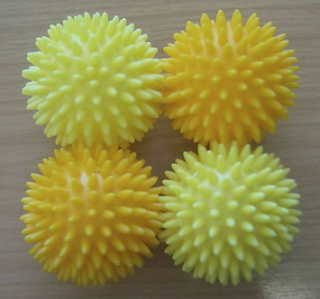Spiky plastic balls kicked into touch
 The Court of Appeal has today issued its judgment in the matter of Green Lane Products Ltd v PMS International Group Plc & Ors [2008] EWCA Civ 358. The case related to validity of a Community registered design, and in particular whether prior art not in the same design field should be taken into account. The High Court had previously held that it should (see IPKat commentary here).
The Court of Appeal has today issued its judgment in the matter of Green Lane Products Ltd v PMS International Group Plc & Ors [2008] EWCA Civ 358. The case related to validity of a Community registered design, and in particular whether prior art not in the same design field should be taken into account. The High Court had previously held that it should (see IPKat commentary here).Green Lane made and sold spiky balls for use as laundry aids, and had applied for and obtained registered designs for them (one of which is shown, top right). The designs were all listed in Locarno class 07.05 ("Flatirons and washing, cleaning and drying equipment"). PMS had previously been selling very similar spiky balls (bottom right), but for use instead as massage aids.
 The question to be answered was whether Green Lane were allowed to claim that PMS infringed their registered design if they sold their spiky balls specifically as laundry aids. This question came down to the correct meaning in law of "the circles specialised in the sector concerned operating within the Community" in Article 7 of the Community Designs Regulation 6/2002.
The question to be answered was whether Green Lane were allowed to claim that PMS infringed their registered design if they sold their spiky balls specifically as laundry aids. This question came down to the correct meaning in law of "the circles specialised in the sector concerned operating within the Community" in Article 7 of the Community Designs Regulation 6/2002.Entirely unsurprisingly, although after much theoretical analysis, Jacob LJ decided that, since a registered Community design right gave its owner a monopoly over any kind of goods according to the design, it would be nonsensical to consider validity only in relation to the field in which the right was to be registered. It made complete sense, therefore, that the prior art available for attacking novelty should also extend to all kinds of goods, subject only to the limited exception of prior art obscure even in the sector from which it comes.
The only odd aspect of the judgment, as far as the IPKat can see, was that by the time the decision came to be made, the parties had already come to an agreement, and had requested that no order should be made. Not to be put out by this, Jacob LJ decided that, since the matter was clearly of practical significance to others, it would be in the public interest to issue the judgment anyway, and stated that he would have dismissed the appeal and refused a reference to the ECJ on the matter, but in view of the parties' agreement it would be unnecessary to draw up an order to that effect.
More spiky balls here and here. More bald men fighting over a comb here.
